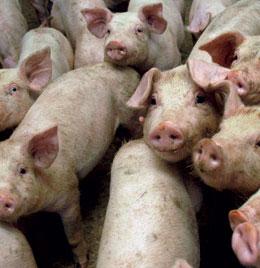
Nature | When the Ebola Reston virus was discovered in pigs in the Philippines last year, it marked the virus's first known foray outside primates, and raised fears of a potential threat to human health.Been collecting, if not connecting, these dots for a minute now. What is it with the low-level pandemic vibe in the zeitgeist? Must be that Agro-Defense facility in the works just up the road a stretch in Manhattan KS....,
Last week, a joint mission of 22 international health and veterinary experts returned from investigating the outbreak with more questions than answers about the virus's pathology and epidemiology.
The Ebola Reston virus was first discovered, in 1989, in crab-eating macaques imported to the United States from the Philippines. Since then, the virus has killed most infected monkeys, yet had no effect on the 25 people that it infected — unlike three of the four other strains of Ebola, which kill between 25% and 90% of the humans they infect.
Because few people come into close contact with primates in the Philippines, the risk of catching Ebola Reston in this way is relatively low. By contrast, the appearance of the virus in an important livestock species was unexpected and worrying, says Pierre Rollin, an Ebola expert at the US Centers for Disease Control and Prevention (CDC) in Atlanta, Georgia, who was part of the mission to the Philippines. "We never thought that pigs could be infected," he says.
Once inside the pig, it may be possible for the virus to mutate into a version that is deadly to humans, as the avian influenza virus is thought to have done. "And we still don't know what it might do to someone who is immunocompromised by HIV or by drugs," Rollin adds.


0 comments:
Post a Comment